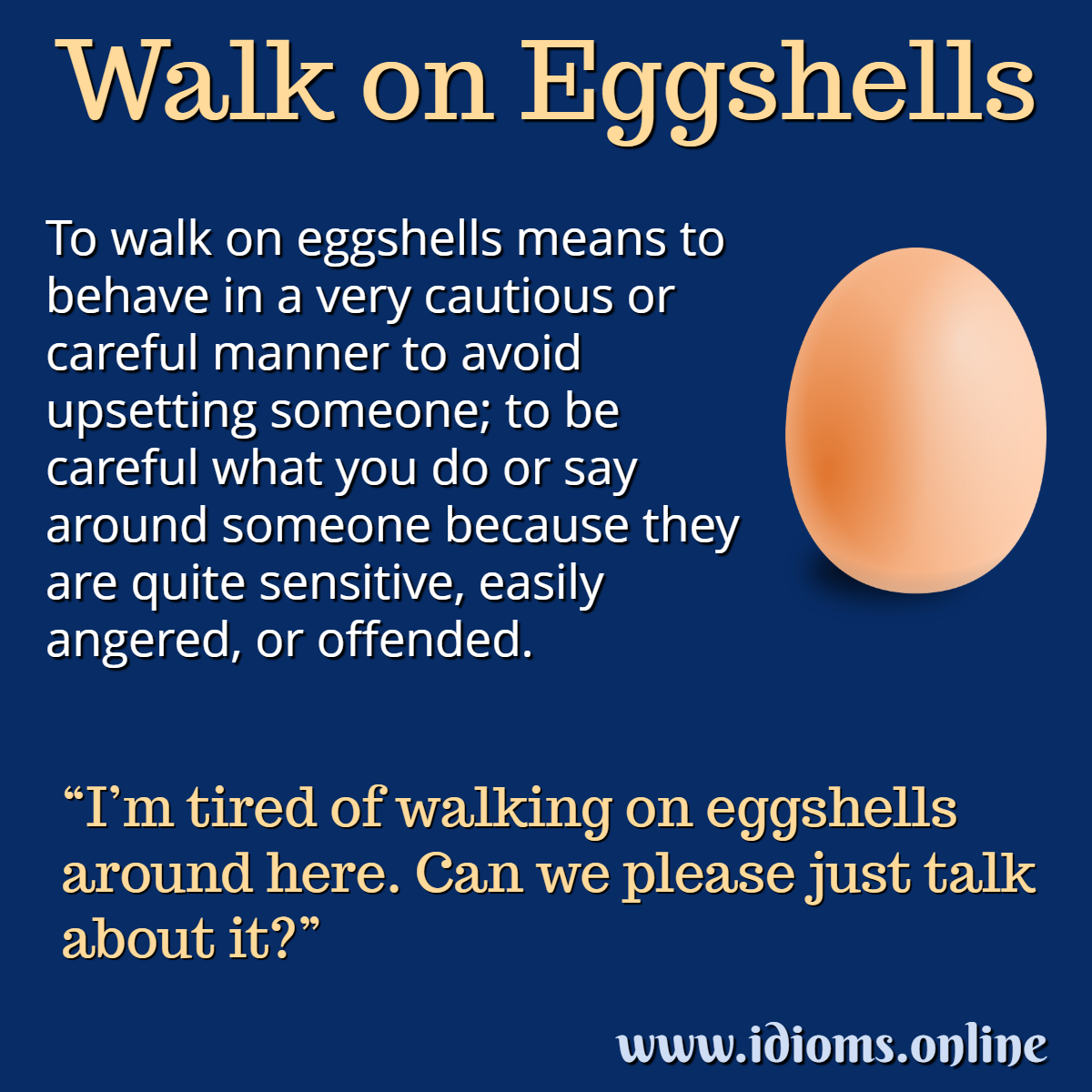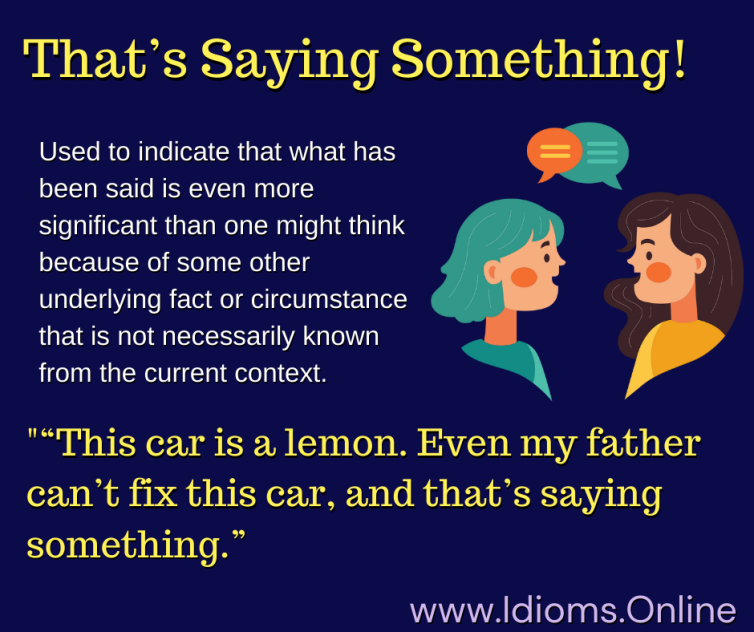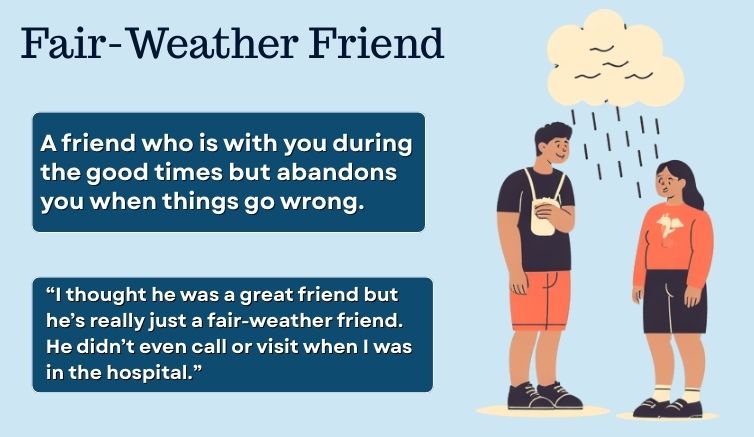Idioms are phrases whose meanings cannot easily be known from the meanings of each word in the phrase. They usually have a fixed form that resists being altered without changing the meaning of the phrase. While idioms are quite transparent to native speakers of a language, they are a source of frustration and perplexity for those seeking to learn a new one. Welcome to Idioms Online, your free English idioms dictionary, the best way to learn about idioms on the web. Here you can search for idioms by using the site search, by the first letter, or by individual words or theme.
Featured Idioms
Idioms Examples: Common Everyday Idioms
Never Mind
Never mind means to disregard something; to take no notice of something; to not worry about something; to not be troubled by something, or to not be upset by something.
“Never mind, you don’t want to learn any more English phrases and idioms.”
Do you mind?
Do you mind is used in two ways. One is to ask someone politely for permission or to ask them to do something.
“Do you mind helping me carry these boxes?”
It’s also used as an exclamation of annoyance at something someone has done or is doing. Let’s say your sister is practicing her violin, loudly, while you are trying to study.
Do you mind? I’m trying to study!
Do Your Best
To do one’s best means to try one’s best to do something; to do as well as one possibly can. When say ‘do your best’ we mean to try your hardest to do something as well as you can. Often, this expression is used in response to someone expressing doubt about their ability to get something done.
“I don’t know if I can get this done by tomorrow.”
“Just do your best.”
I Hope Not
I hope not is used to say that you do not want something to happen or you do not want something to be true.
“I think the game is going to be canceled because of the rain.”
“Well, I hope not.”
I Hope So
I hope so is used to say that you want something to happen or you want something to be true. It is also used to say that you think something might happen or be possible.
“I think we are going to win the World Series this year!
“I hope so!”
“Are you going to be able to come home for Christmas?”
“I hope so. I’m trying to get enough time off from work. I only have off Christmas day.”
In a Second or In a Minute
In a second and in a minute are interchangeable. They both mean a very brief, but undetermined, amount. When we say, in a second, we do not literally mean a second, although a common joke response is to reply “your second is up” a moment later. You can also say, just a minute, wait a minute, or in a moment.
“I’ll be there in a second. I just need to finish getting ready.”
“Can you bring me a soda?”
“In a minute.”
Give Me a Second or Give Me a Minute
Give me a second or give me a minute is much the same as in a second or in a minute. They are used to tell someone to allow you a brief period of time before doing something.
They can be used in much the same way as the previous phrases, but ‘to do something’ is often added as in ‘give me a second to explain!”
They can also be used in regards to other things besides people.
“Give me a second to finish washing the dishes and then I can watch the movie with you.”
“Give the car a minute to warm up first.”
Any Second Now
Any second now means very soon; within a few moments. You can also say any minute now or any moment now.
“He’ll be back any second now. Can I get you a coffee or something else to drink?”
In a Mood
If you are in a mood you are not acting very friendly because you are angry, cranky, unhappy, worried, frustrated, etc. When we say someone is ‘in a mood’ we mean they are in a BAD mood. The bad is understood. To say someone is in a good mood, you have to use the word good.
“Just ignore Peter. He’s in a mood today.”
How does that sound? (How does something sound)
How does that sound means what do you think of it? What do think of my plan or suggestion? If you like the idea, the common response is, ‘that sounds good.’
“I was thinking about going for Thai food tonight. How does that sound?”
“Yeah, that sounds good.”
Sounds good or that sounds good (great, awesome, fantastic)
As before, sounds good or that sounds good can be used to tell someone that you like their plan or suggestion and as a response to ‘how does that sound.’
It can also be used to respond to anything that is good news or that you are happy about. Usually, in the form ‘that sounds great’ or ‘that sounds awesome.’
“I just made reservations to that new restaurant everyone is raving about.”
“That sounds great!”
Feel Like (feel like doing something)
To feel like doing something means to want to do it; to have the urge, desire, or inclination to do something; to be in the mood to do it.
“Do you feel like watching a movie?” “Sure.”
A very common phrase is ‘what do you feel like eating?’ This means ‘what do you want to eat?’
You can also use feel like to describe what you want to eat. “I feel like pizza tonight.” This doesn’t mean you feel like you are a pizza, but that you have a desire to eat pizza.
Let Me See (or Let Me Think)
Both let me think and let me see are used to say that you are trying to think of something or remember something.
Let me see, additionally, can be used to indicate that you are trying to find a certain piece of information, perhaps by looking at a computer.
“What’s the name of that new show you wanted to watch?” “Let me think. What was it…?”
“Can I make an appointment for tomorrow?” “Let me see – yes, I can book you in for 2 pm. How does that sound?”
Let Me Think About It
Let me think about it is not the same as ‘let me think, used alone. When we say let me think about it, we are telling someone that we don’t know right now but we will think about it and give them an answer later.
“Are you coming to the party?” “I’m not sure. Let me think about it.”
Not Really
Not really is a non-commital or non-forceful way to say no.
You may think that this is a silly way to say no. Why not just say what you mean? Well, this phrase is used to say no in a more polite way. To blunt the force of the ‘no’ and deliver it just a bit more gently. And, whether you like it or not, it is an everyday idiom in the English language, used all the time. In fact, it’s used constantly. You can also combine this with no as in ‘No, not really.’
“Did you like the movie?” “Not really.”
“Do you believe Harrison is going to stick with this new job?” “Not really.”
Sorry to Bother You
In English, to bother someone means to take up some of their time or annoy them. When we say ‘sorry to bother you’ we are apologizing for taking up someone’s time or annoying them. While this can be a sincere expression of apology, it is just as often a phatic expression. That is, it is a polite social convention.
“Sorry to bother you, but can you tell me where the restrooms are?”
“Sarah, sorry to bother you, but Ms. Collins is here to see you.”
Sorry for bothering you is a variation but it can also serve as an informal way to apologize for ‘bothering someone in the past. “Sorry for bothering you yesterday.” You can also say ‘sorry to have bothered you yesterday.’
Idioms Used to Describe People
What Is an IDIOM?
Idioms are different from other expressions. An idiom is a phrase, sure, but as John Ayto puts it, this idiom phrase “behaves more like a word.” 1 In fact, like words, linguists consider idioms to be ‘semantic units,’ meaning units of speech that can stand on their own. However, unlike other expressions, the meaning of an idiom is not always easy to tell based on the words used. They are groups of words that mean something different than they appear to mean.
Although idioms are everyday figures of speech that we use without thinking, they are almost always figurative. Despite this, we give no thought to them. We know what they mean just as we know what most words mean.
So much of what we say relies on grammatical rules. When speaking, we make choices based on a large number of rules, resulting in an astounding number of different word combinations. Idioms change this. They are pre-constructed (or at least partially pre-constructed) and set, and resist being analyzed by examining their parts.
Some idioms are more limited than other types of expressions in how they can be used. Words cannot be substituted, and tenses cannot be changed, for example, without changing the meaning. An example often given is kick the bucket. You cannot say the bucket was kicked and have it mean the same thing. These are called frozen idioms.
This is not to say that they are always, or even ever, completely unanalysable. Many idioms are at least partially compositional, and certain words can be changed with the idiom still being understood. For example, to open a can of worms means to do something that makes things more complicated than they were before, thus giving you more problems than you would have had if you had left things as they were. We can understand the “can of worms” as corresponding to “all the other problems.” And “opening” as corresponding to the action that brought about all these other problems. We might even say “open the proverbial can of worms,” thus underscoring the metaphor and calling attention to the fact that can of worms means the same things as many problems. So, idioms are not so straightforward and meaningless as many sources lead us to believe.
Throughout the site, when pursuing idioms, keep in mind that they can be very context-dependent. In fact, many idioms are only used in certain situations. The situations they are used in can give us clues to their analysis. For example, we’ve already seen that the idiom can of worms would be used in a situation in which one is dealing with a problem or set of problems. Likewise, we would never have to break the ice with our best friend. This idiom would only be used in regards to social tension or unease.
Idioms are sometimes confused with aphorisms, which are short sayings which convey a general truth, sometimes called proverbs. Just as often, idioms can behave like aphorisms and vice versa. They can also be slang.
Why Have an English Idioms Dictionary?
One reason to have a site about English and American idioms is so that those learning English as a second language can find out what they mean! Idioms are confusing when learning a new language. You can’t take them literally, but if you haven’t grown up with them, you may not understand them at all, despite understanding the meaning of the individual words used.
The number of idioms used in everyday conversation is staggering. You cannot hope to be a confident speaker of the English language without a broad understanding of idioms, even if it is to understand the people you encounter in your daily life.
Another reason to have a site about idioms is that they are fascinating in their own right. What if I told you other sites about idioms cut corners? Would you think these sites had no corners? Of course not. If you are a native speaker of English, you would surmise that I mean these sites were not very informative. What if I told you idioms were a hot-button topic? Clearly, I am not talking about a button you can push on this site, let alone a hot one.
Not many people are willing to give up their day job to write a site about idioms.
You do not know if I have a day job, or what it may be, but most native English speakers probably know what I meant by “not giving up your day job,” just as they knew what I meant by cutting corners and hot button. Although some idioms are quite straightforward, for the most part, if you do not understand them automatically, understanding the meaning of each word would not always help you arrive at the true meaning.
We take all these expressions for granted, hardly noticing them or sparing a moment to reflect on the fact that they are, by themselves, almost incomprehensible. The more you start paying attention, the more you will notice how much we use them. The next time you watch TV, start listening for idioms. You’ll be amazed. They are countless. How do people from other countries ever understand a word we say?
Idioms reflect our shared culture and provide a fascinating glimpse into linguistics. Instead of looking at language as individual words, used according to rules, we realize that language is often constructed by word chunks that we hear as if they are basic units. The fact that idioms exist while ignoring grammar, yet act as basic units of language, may show us that there is much more to language than your stodgy English teacher taught you.
Surely, these cannot be random phrases? They must have a history. So, another reason to have a site about idioms is to try to tease out this history.
Featured Idiom Lists
How the Idiom Site is Organized
Idioms Online is, first and foremost, and idioms dictionary. The pages on this site are listed in alphabetical order, to the extent possible, using the first letter of the first word of the idiom which is not an article (a, an, the). For example, if you were looking for the idiom penny for your thoughts, you could use the alphabetical index above to go to P where you would find all the idioms on the site which start with P.
The idioms are also cross-referenced by words and also theme when possible. The easiest way to find a particular idiom is to search the site using the search box.
When viewing a particular idiom, to find related idioms, scroll down to the bottom of the page, where you will find idioms cross-referenced by similar words as well as more idioms starting with the same letter as the present idiom.
Although I take pains to organize the site with as much detail as possible, you should be wary of sites that seem to have too many general categories as this often suggests a false idea of how idioms are used. For example, just because you sometimes encounter an idiom being used in a business setting doesn’t mean it is a business idiom. The same idiom might be used in various contexts. Although there are certain idioms that are unique to business, if English is your second language but you need to do business in English, habitually using certain idioms you believe to be ‘business’ idioms will sound very odd to native English speakers.
Idiom Origins
Many of the idioms defined here on Idioms.Online also include information on the origin of the idiom. What information is included depends on what is known about the history of the particular idiom. The word “origin” should not always be taken to mean that the exact origin of the idiom is being presented.
We do know the exact origins of many idioms. For example, many idioms come from literature or the Bible. Given the huge number of English idioms, however, the exact origin of most idioms is not known. When the origin is unknown, the earliest date of use will usually be given, at the least.
Sometimes, the allusion of an idiom is given as a clue to how it originated. The allusion of an idiom describes what is “alludes to.” To allude to something means to refer to it indirectly. This type of allusion information can be an aid in understanding the idiom. Many times the allusion is quite obvious.
There are also many origin stories for idioms. These stories are often fanciful and were invented after the idiom was already in use. Other stories are more credible, such as those that can be historically verified. For instance, many idioms have nautical or military origins.
Whether you are working to learn English or are just curious about certain idioms, this site is for you.
More Common Idioms
- Go to Bed: to get into bed with the intention of going to sleep or retiring for the night.
- Hit the Hay/Sack: synonym for go to bed, to get into bed with the intention of going to sleep or retiring for the night.
- Make Up the Bed: to arrange and straighten the covers on a bed so that it is ready to sleep in.
- Get Up on the Wrong Side of the Bed: to start the day in a bad mood and to be grumpy all day and easily annoyed, but for no apparent reason.
- You Can Say That Again: that is true; I agree with you completely.
- Off the Top of My Head: to say something spontaneously, without much thought or consideration as to whether one is correct; to give a quick guess or to estimate something.
- Make Do: to start the day in a bad mood and to be grumpy all day and easily annoyed, but for no apparent reason.
- Fed Up (with something): to be tired of something occurring and wanting it to stop; to be unable to tolerate something any longer.
- What’s the Catch: what is the problem, disadvantage, drawback, etc. in an otherwise good situation.
- So What?: why does it matter?; of what importance is it?; why should I (you, someone) care?


































